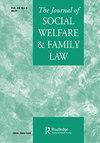‘A family affair: the role of intergenerational norm transfer in shaping finances in adult relationships’
IF 0.9
Q2 LAW
引用次数: 1
Abstract
ABSTRACT This article analyses the rationales of individuals for their financial behaviour in adult relationships, drawing on data from qualitative interviews. In terms of what happens to assets upon relationship breakdown, policy-makers continue to support a distinction between married and cohabiting couples. Assumptions around ‘legal rationality’ centre on a notion that, having chosen to formalise their relationship (or not) based on the legal implications, married couples will also ultimately opt for greater financial ‘jointness’. This article presents a different perspective, arguing that it is not relationship form that predominantly influences peoples’ approaches to finances. Instead, there are other, under-recognised factors that structure their behaviour. These can be represented by significant milestones, such as moving in/purchasing a property together, or having a child. Adopting a ‘relational’ lens, the article also identifies the role of individuals’ parents in affecting their behaviour, contending that people carry into their adult relationships the marks of their parents’ relationships with finances. Having observed their parents’ behaviour, some participants replicated the practices and principles of their financial ‘models’, while others sought to avoid this. In both cases, contrary to assumptions about ‘legal rationality’, participants were more strongly influenced by their childhood experiences than by their relationship’s legal status.“家庭事务:代际规范转移在成人关系中塑造财务状况的作用”
本文利用定性访谈的数据,分析了个人在成人关系中财务行为的基本原理。在关系破裂后财产的处置方面,政策制定者继续支持区分已婚夫妇和同居夫妇。关于“法律合理性”的假设集中在这样一种观念上,即已婚夫妇根据法律影响选择将他们的关系正式化(或不正式化),最终也会选择更大的经济“共同”。本文提出了一个不同的观点,认为主要影响人们理财方式的不是关系形式。相反,还有其他未被认识到的因素影响着他们的行为。这些可以用重要的里程碑来表示,比如一起搬进来/买了房子,或者有了孩子。从“关系”的角度来看,这篇文章还指出了父母在影响个人行为方面的作用,认为人们在成年后的关系中会带着父母与财务关系的印记。在观察了父母的行为后,一些参与者复制了他们的金融“模型”的做法和原则,而另一些人则试图避免这种做法。在这两种情况下,与“法律合理性”的假设相反,参与者更受童年经历的影响,而不是他们关系的法律地位。
本文章由计算机程序翻译,如有差异,请以英文原文为准。
求助全文
约1分钟内获得全文
求助全文
来源期刊
CiteScore
2.00
自引率
13.30%
发文量
52
期刊介绍:
The Journal of Social Welfare & Family Law is concerned with social and family law and policy in a UK, European and international context. The policy of the Editors and of the Editorial Board is to provide an interdisciplinary forum to which academics and professionals working in the social welfare and related fields may turn for guidance, comment and informed debate. Features: •Articles •Cases •European Section •Current Development •Ombudsman"s Section •Book Reviews

 求助内容:
求助内容: 应助结果提醒方式:
应助结果提醒方式:


